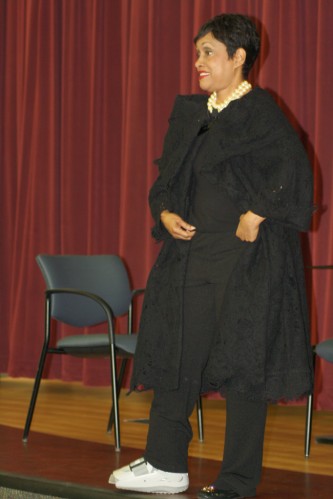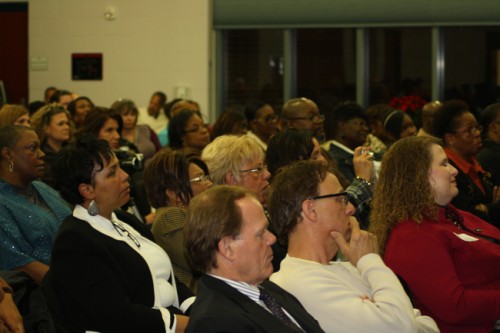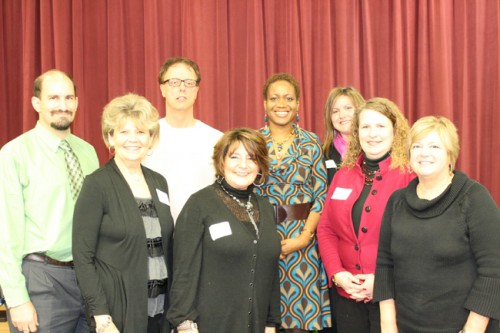By Sonya Bernard-Hollins, editor
editor@comvoicesonline.com

KALAMAZOO (MICH.)- She wasn’t there to talk about herself. The famous television show Judge Glenda Hatchett came to the Kalamazoo County Juvenile Home to have what she called “a conversation with the community,” about children. Her mission was to get more volunteer advocates for youth in the Court Appointment Special Advocates Program (CASA) in order to save the lives of children who are hopeless in the juvenile court systems without someone on their side.
As a national spokesperson for CASA, she talked about her own childhood and how having a community of caring adults helped shape her own life and the way she runs her courtroom today. Her recollection of teasing a blind neighbor by throwing berries at his door and waiting for him to come and discover no one was there, was comical, yet necessary to get her point across.
“I thought that because Mr. Farmer couldn’t see (my friend and I) didn’t have to run,” she laughed. “But, what we didn’t realize was that Mrs. Johnson from across the street could see us, and she came and snatched us up, and took us to our parents who snatched us up again. But while we called Mrs. Johnson, ‘Mrs. Hawkeyes,’ we need more Mrs. Hawkeyes’ for this generation of children.”
Hatchett was a corporate lawyer for Delta Airlines and the company’s highest African American woman before being asked to apply for the position as Chief Presiding Judge of the Fulton County, Georgia Juvenile Court. This led to her becoming Georgia’s first African American Chief Presiding Judge of a state court and the department head of one of the largest juvenile court systems in the country. After just a week on the bench, her heart began to melt as she witnessed the youth who came into her court struggling for a place in life. Many were from abusive, neglectful and absent parents who threw their children away to the foster care system.
It was Hatchett’s interest in CASA that led to her advocating for the funding for a program in her area to provide volunteers as advocates for these children. Her dedication led to her own television show, “Judge Hatchett,” now in its 10th season. She also has used her passion and influence to form Parent Power Now, an online parenting network.
“Our children are all we have to build a new generation of men and women,” Hatchett said to the more than 200 community leaders, social workers and others interested in working with youth who attended the dinner event. “We as adults are charged with guaranteeing their safe passage from here to their adulthood. And still even into adulthood we need to be there to cheer for them, pull for them. Not enough of our children have someone who says, ‘I’m pulling for you,'” she said.

Hatchett’s ‘conversation with the community’ was built on stories of those she had met throughout her experiences on the bench. She told stories of CASA volunteers who went above and beyond to find fit relatives for children to live with in order to stay out of the foster care system. She talked of children who cried for help through acts of criminal activity, simply because they had no one who knew how to uncover the layers of pain that led to their current state of delinquency.
As a member of the Board of Advisors for the Atlanta Falcons Football Organization, she admits she is a big fan of sports. It was her analogy of a basketball stadium with more than 20,000 seats that drove her point of volunteering for CASA home.
“Close your eyes and imagine standing in center court. Imagine every seat empty. Now open your eyes and see every seat filled with a child. Now, multiply that by 40. That’s the number of children in the foster care system; more than 800,000. So many children that all would not have a seat in that stadium,” Hatchett said.
The judge said being a CASA volunteer is a way to help keep a promise to a child that someone cares for their safety and future. She said there are few workers and the need for more is great.
She closed saying a quote from her opening address: “Thank God for those standing in the battle on the front lines and not looking for a sheltered rear.
After the standing ovation, Sharie Latham, Volunteer Services Coordinator of CASA, presented Hatchett with a plaque mounted with keys from the former juvenile facility. Volunteers of the local CASA were recognized for their dedication to youth in Kalamazoo. The CASA program began in the city in 1979 by John Ray to help foster care children receive an independent advocate. The city’s program was used as a model for others throughout the country.
Volunteers recognized include:

Lilly Amos, Rena Heleniak, Bruce Heleniak, Kevin Hoffer, Al Hopkins, Stacey Hunter, Nancy Maturen, Barbara Miller, Rosealie Novara, Pat VanNiman, Erica Wilkinson, Beth Wilson, Janet Wright, Carol Zielenski, Shannon Poortenga, Keith Hovious, Lisa Coleman, Cheryl Green-Ollie, and Sharon K. Merrick.
Those interested in more information regarding CASA should contact Sharie Latham at 269-385-6078, or email: smlath@kalcounty.com.
